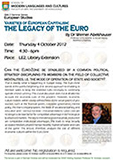
| News & Events |
| 4 October 2012 | |
Seminar: Varieties of European Capitalism: the Legacy of the Euro Dr. Werner Abelshauser Date: Thursday 4 October 2012 |
|
Can the Euro-Zone be stabilized by a common political strategy disciplining its members on the field of collective mentalities, i.e. the mode of operation of state and society? That is exactly what is happening in Europe today. The Euro-Zone stands at the painful beginning of its second approach to enabling its member states to keep the restrictive rules necessary to commonly operate a hard currency. This crucial discussion does not at all take into account the economic core of the problem. However, economic culture matters within clearly defined fields of the social system of production, such as the financial system, corporate governance, interest policy, the inter-company-system, the fields of vocational training and education and – last but not least – industrial relations. Labor costs are no longer a decisive factor for competitive advantage in technologically advanced markets. The key to immaterial (post-industrial) production are comparative institutional advantages. This leads to new, broadly accepted mindsets (shared mental models), market behavior and rules of the game. This lecture, therefore, analyses the role of different economic cultures within the Euro-Zone. About the speaker: The lecture is part of German month and will be moderated by DAAD Visiting Assistant Professor Dr. Andreas Leutzsch. |
|
